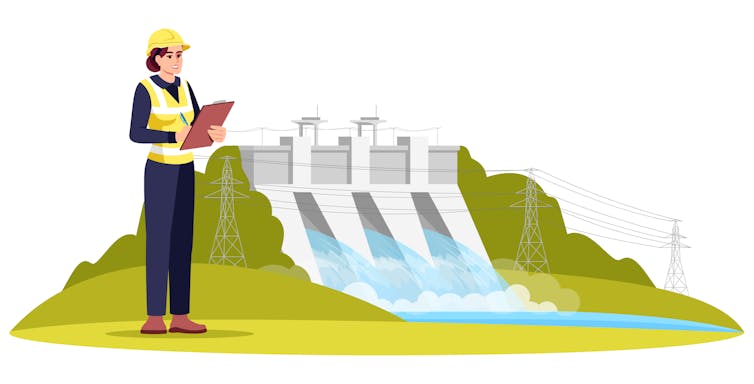World leaders gather for the UN climate summit (Cop30) in Belém, Brazil, amid concerns about the slow progress in cutting global carbon emissions. Ten years into the historic Paris climate agreement, we are off track to meet its core objective, to keep global warming well below 2°C, relative to pre-industrial levels.
Yet there are glimmers of hope, and none more important than the astounding progress on renewable energy. Renewables are now so cheap that the clean energy transition is no longer an economic burden, it is a momentous opportunity.
Climate change campaigners tend to see renewables as an environmental imperative, an effective way of cutting emissions. They are that, of course. But they are also a powerful engine of investment, jobs and growth. They are reshaping the global economy. In my team’s new report, we lay out the evidence.
The first economic dividend of renewables is inclusion. Access to affordable energy remains a critical sustainable development goal, which shapes everything from education to health to women’s empowerment. Distributed renewables – from solar home systems to mini-grids – are our best chance yet of bringing affordable energy to all.
Across Africa, Asia and Latin America, renewable energy entrepreneurs are doing what national grids have struggled to do: reaching remote villages and replacing polluting diesel generators with clean, reliable power.
Because of its modularity, renewable electricity can be built out fast, expanded flexibly and maintained locally. Renewable energy firms are combining these technical advantages with new business models that make renewables more accessible (for example, through pay-as-you-go models) and keep benefits in the local community (for example, by offering energy services like cold storage, phone charging and water pumping, as well as electricity).
Investment, jobs and growth
If inclusion is the first dividend, investment is the second. Every dollar invested in renewables delivers more economic bang than a dollar spent on fossil fuels. The International Monetary Fund estimates that clean energy investments generate about 1.5 times their cost in economic activity, while fossil fuels yield less than one-for-one. Renewables do not just pay back; they pay forward through spending on supply chains and local wages.
The numbers are staggering. Between 2017 and 2022, climate finance flows into the 100 largest developing countries (excluding China) boosted their GDP by a combined US$1.2 trillion (£0.9 trillion) – the equivalent of 2-5% of GDP for most nations. In Brazil, the host of Cop30, renewable investments raised GDP by US$128 billion over those six years, according to our report.

bsd studio/Shutterstock
Climate finance flows are still insufficient. To increase them, we need more concessional funding, more risk guarantees and more partnerships between governments, investors and local communities.
In the Dominican Republic, a blend of policy reform, clear incentives and blended finance has helped the country mobilise over US$6.5 billion in clean energy investment and double its renewables capacity in just three years.
The energy transition is often painted as a jobs killer, but the evidence says otherwise. Intergovernmental organisations project that there will be 43 million clean energy jobs by 2050, far outstripping those lost in fossil fuels.
For our report, we took a closer look at the jobs market in South Africa. For 12 months we collected data from job adverts and found a striking fact: clean energy jobs pay 16% more on average than all other advertised roles. For the most part the higher wages reflect the fact that clean energy jobs are high-skilled jobs, which require experience, training and problem-solving skills.
The high skills requirements are a challenge as well as a boon. Taking full advantage of the clean jobs revolution will require proactive skills development, both in the classroom and on the job. But for the young labour forces of many developing countries, the message is clear: renewables are not just a climate strategy, they are a job opportunity.
Read more:
What are green jobs and how can I get one? 5 questions answered about clean energy careers
Perhaps the most underappreciated economic benefit of renewables concerns productivity. Cheap, efficient energy is the lifeblood of industrial growth. Renewable energy is now much cheaper than fossil fuels, particularly when factoring in what is lost when turning energy (say, car fuel) into usable services (propulsion).
We calculated that with a rapid conversion to renewables, energy-sector productivity could double by 2050, compared to both current levels and a fossil fuel future. Since energy is such a ubiquitous input to all other economic activities, this has significant economy-wide benefits. For some developing countries, the GDP boost could be as high as 9-12% – simply from having more efficient energy services.
These productivity gains are not evenly distributed. For once it could be developing countries that benefit most. Industrialised countries grew rich on the back of cheap and abundant energy. In a low-carbon economy, it will be sun-rich developing countries that have the cheapest, most abundant sources of energy. This critical shift in comparative advantage could finally help to narrow the global prosperity gap.
At Cop30, leaders are debating climate targets, finance mechanisms and transition timelines. But they should also recognise this deeper reality: renewables are not a drag on growth but its new engine. In a world anxious about growth and prosperity, the clean energy transition is an economic strategy as much as an environmental one.
The challenge, as our report reminds us, is to share these gains equitably. Without fair benefit-sharing the transition risks repeating the inequities of the fossil fuel era. But get it right, and renewables can power not just cleaner economies, but fairer ones.

Don’t have time to read about climate change as much as you’d like?
Get a weekly roundup in your inbox instead. Every Wednesday, The Conversation’s environment editor writes Imagine, a short email that goes a little deeper into just one climate issue. Join the 45,000+ readers who’ve subscribed so far.

